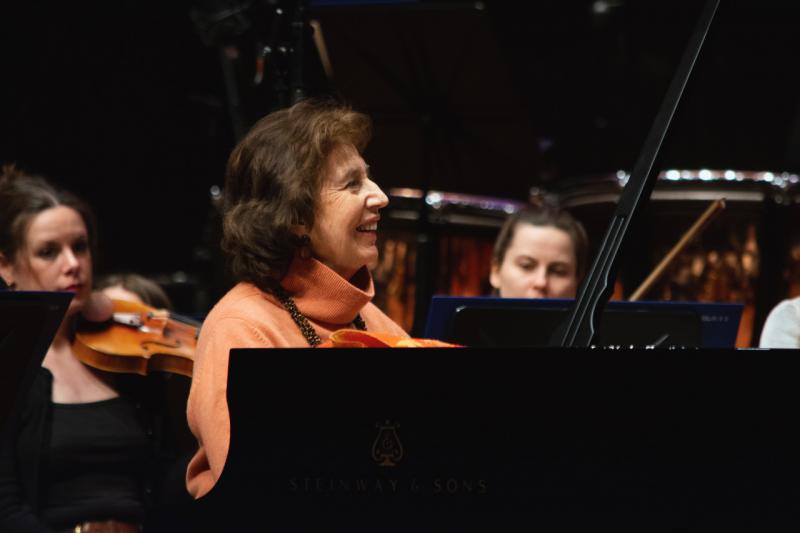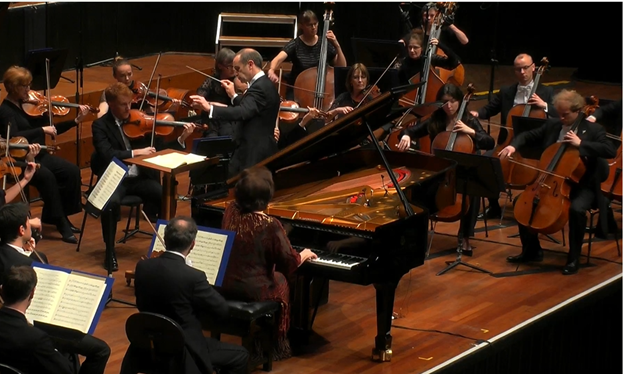Cooper, Bournemouth SO, Wigglesworth, Lighthouse, Poole review – musical sunbursts | reviews, news & interviews
Cooper, Bournemouth SO, Wigglesworth, Lighthouse, Poole review – musical sunbursts
Cooper, Bournemouth SO, Wigglesworth, Lighthouse, Poole review – musical sunbursts
Vivacious teamwork in Dove, Mozart and Schubert

With reference to smiles beginning to emerge from behind our masks, Mark Wigglesworth, the Bournemouth Symphony Orchestra’s new Principal Guest Conductor, wrote the most hopeful and optimistic note of welcome in the programme for this concert featuring Mozart’s Piano Concerto No 22, K482 and Schubert's “Great” C major Symphony.
The opening work, Jonathan Dove’s Sunshine, was composed in 2016 as an encore piece premiered the following year. In the event, music and musicians sparkled and shone as though airborne over an ever-changing natural landscape to achieve five minutes of inspirational and magical uplift. Sunshine proved to be just as effective as a concert opener, a brilliant shaft of light to preface Mozart and Schubert at their sunniest and greatest.
Imogen Cooper’s searching performance of the Mozart concerto, composed while he was working on The Marriage of Figaro, took the operatic cue to perfection. Alert to every nuance of phrasing, dynamic and tonal colour in the proposals exchanged between keyboard and orchestra, shared rapport was engagingly conversational throughout. Moments where the pianist’s left hand becomes another character rather just an accompaniment to the right hand dazzled against the congregation of strings at every twist and turn.
The soul-searching intimacy of the central Andante delved deep in search of consolation, beautifully contrasted with the sinuous dialogue between flute and bassoon, where Anna Pyne and Tammy Thorn excelled. Every kind of nod and wink was lavished on the genial main theme of the finale for its varied appearances before a beautifully poised mini-serenade for wind. Time then stopped for a collective holding of breath for Cooper’s last cadenza as she summoned each character back to take a bow, their various traits expressed with a sense of reconciliation and hope before the sun reappears for everyone to skip merrily home.  It’s many a year since I’ve heard a performance of this concerto that has so vividly inhabited the operatic stage with such chemistry and insight. It's astonishing that this was Cooper’s first collaboration with Wigglesworth. Between them they pulled the music out of the air to conjure a cast and scenario worthy of Da Ponte. The pianist’s array of smiles as she voiced or accompanied their lines was a source of joy that told us much of what we need to know, understand and change.
It’s many a year since I’ve heard a performance of this concerto that has so vividly inhabited the operatic stage with such chemistry and insight. It's astonishing that this was Cooper’s first collaboration with Wigglesworth. Between them they pulled the music out of the air to conjure a cast and scenario worthy of Da Ponte. The pianist’s array of smiles as she voiced or accompanied their lines was a source of joy that told us much of what we need to know, understand and change.
“Effortless to conduct, but not to play” – thus our conductor in his BSO Livestream introduction as Alpine hiking guide to Schubert’s “Great C Major”, with the caveat that any exertion or exhaustion for the players should not be visible. I’m sure we’ve all been to performances where midway through the seemingly unending accompanying triplet figure for the upper strings in the finale, several desks of eyeballs look heavenwards for mercy as finger joints seize up, bowing arms falter and sweat begins to drop from collective chin rests. No visible or audible evidence of fatigue on this occasion, however. Quite the contrary – with single-minded focus on various states of repetitive rhythmic impetus coursing through each movement, Schubert’s most Beethovenian take on the symphony was challengingly swift, but consistently fleet of foot.
Conducting without a score, Wigglesworth sought transparent orchestral balance, a beautifully paced introduction immediately announcing a galvanising performance that knew where each movement was travelling within the trajectory of the symphony as a whole. With little relaxation of tempo, more lyrical sections may not have always offered ideal contrast within their framework, but Wigglesworth’s sleight of hand cunningly lightened the mood sufficiently by removing the bar lines so that the longer phrases still sang to the sun.
Come the second movement, what begins as a genial and buoyant march progresses ever deeper into darkness, ultimately reaching a dead end. Is this just losing one’s way deep in the forest? The increasingly persistent and louder military fanfares that subsume the march leading to this impasse suggest otherwise. Wigglesworth set the pace of the march more briskly than usual, generating a fearsomely relentless approach to something much more cathartic. The sun returned, but with a glimmer of its former self. It was back on track thereafter with a bracingly incisive scherzo and trio followed by a whirlwind finale, neither taking any hostages to fortune and moving the whole performance into an all-consuming blaze of restorative light. BSO looks set more than fair for great things with their recent appointment.
rating
Explore topics
Share this article
Add comment
The future of Arts Journalism
You can stop theartsdesk.com closing!
We urgently need financing to survive. Our fundraising drive has thus far raised £49,000 but we need to reach £100,000 or we will be forced to close. Please contribute here: https://gofund.me/c3f6033d
And if you can forward this information to anyone who might assist, we’d be grateful.

Subscribe to theartsdesk.com
Thank you for continuing to read our work on theartsdesk.com. For unlimited access to every article in its entirety, including our archive of more than 15,000 pieces, we're asking for £5 per month or £40 per year. We feel it's a very good deal, and hope you do too.
To take a subscription now simply click here.
And if you're looking for that extra gift for a friend or family member, why not treat them to a theartsdesk.com gift subscription?
more Classical music
 Lammermuir Festival 2025 review - music with soul from the heart of East Lothian
Baroque splendour, and chamber-ensemble drama, amid history-haunted lands
Lammermuir Festival 2025 review - music with soul from the heart of East Lothian
Baroque splendour, and chamber-ensemble drama, amid history-haunted lands
 BBC Proms: Steinbacher, RPO, Petrenko / Sternath, BBCSO, Oramo review - double-bill mixed bag
Young pianist shines in Grieg but Bliss’s portentous cantata disappoints
BBC Proms: Steinbacher, RPO, Petrenko / Sternath, BBCSO, Oramo review - double-bill mixed bag
Young pianist shines in Grieg but Bliss’s portentous cantata disappoints
 theartsdesk at the Lahti Sibelius Festival - early epics by the Finnish master in context
Finnish heroes meet their Austro-German counterparts in breathtaking interpretations
theartsdesk at the Lahti Sibelius Festival - early epics by the Finnish master in context
Finnish heroes meet their Austro-German counterparts in breathtaking interpretations
 Classical CDs: Sleigh rides, pancakes and cigars
Two big boxes, plus new music for brass and a pair of clarinet concertos
Classical CDs: Sleigh rides, pancakes and cigars
Two big boxes, plus new music for brass and a pair of clarinet concertos
 Waley-Cohen, Manchester Camerata, Pether, Whitworth Art Gallery, Manchester review - premiere of no ordinary violin concerto
Images of maternal care inspired by Hepworth and played in a gallery setting
Waley-Cohen, Manchester Camerata, Pether, Whitworth Art Gallery, Manchester review - premiere of no ordinary violin concerto
Images of maternal care inspired by Hepworth and played in a gallery setting
 BBC Proms: Barruk, Norwegian Chamber Orchestra, Kuusisto review - vague incantations, precise laments
First-half mix of Sámi songs and string things falters, but Shostakovich scours the soul
BBC Proms: Barruk, Norwegian Chamber Orchestra, Kuusisto review - vague incantations, precise laments
First-half mix of Sámi songs and string things falters, but Shostakovich scours the soul
 BBC Proms: Alexander’s Feast, Irish Baroque Orchestra, Whelan review - rapturous Handel fills the space
Pure joy, with a touch of introspection, from a great ensemble and three superb soloists
BBC Proms: Alexander’s Feast, Irish Baroque Orchestra, Whelan review - rapturous Handel fills the space
Pure joy, with a touch of introspection, from a great ensemble and three superb soloists
 BBC Proms: Moore, LSO, Bancroft review - the freshness of morning wind and brass
English concert band music...and an outlier
BBC Proms: Moore, LSO, Bancroft review - the freshness of morning wind and brass
English concert band music...and an outlier
 Willis-Sørensen, Ukrainian Freedom Orchestra, Wilson, Cadogan Hall review - romantic resilience
Passion, and polish, from Kyiv's musical warriors
Willis-Sørensen, Ukrainian Freedom Orchestra, Wilson, Cadogan Hall review - romantic resilience
Passion, and polish, from Kyiv's musical warriors
 BBC Proms: Faust, Gewandhausorchester Leipzig, Nelsons review - grace, then grandeur
A great fiddler lightens a dense orchestral palette
BBC Proms: Faust, Gewandhausorchester Leipzig, Nelsons review - grace, then grandeur
A great fiddler lightens a dense orchestral palette
 BBC Proms: Jansen, Royal Concertgebouw Orchestra, Mäkelä review - confirming a phenomenon
Second Prom of a great orchestra and chief conductor in waiting never puts a foot wrong
BBC Proms: Jansen, Royal Concertgebouw Orchestra, Mäkelä review - confirming a phenomenon
Second Prom of a great orchestra and chief conductor in waiting never puts a foot wrong
 BBC Proms: Royal Concertgebouw Orchestra, Mäkelä review - defiantly introverted Mahler 5 gives food for thought
Chief Conductor in Waiting has supple, nuanced chemistry with a great orchestra
BBC Proms: Royal Concertgebouw Orchestra, Mäkelä review - defiantly introverted Mahler 5 gives food for thought
Chief Conductor in Waiting has supple, nuanced chemistry with a great orchestra

Comments
I haven't heard the